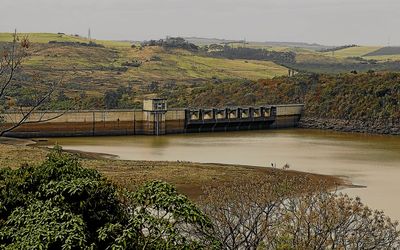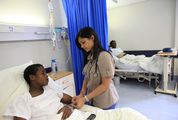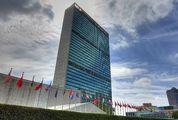PERHAPS the drought is a good thing, thinks the member (of the Upper Jukskei Flyfishing Collective). He means, the drought is mostly bad, but it does focus the collective mind on finding a solution for SA’s general decrepitude, which has resulted from the African National Congress (ANC) government’s mismanagement of the country’s resources.
First, let’s consider just how bad the drought is. People die as a direct consequence, and not necessarily of thirst. Human rights lawyer Richard Spoor tells on Facebook the horrific story of a teenager stoned to death after a fight over water at a spring near a village in the Osuthu River valley in KwaZulu-Natal. People called for an ambulance, but it never came. It never came for the same services-related reason the fight broke out in the first place. The boy is dead even if the drought breaks tomorrow.
The drought will break, but know also that even after it has, the price of SA’s maize will rise and yet more people will become vulnerable to household food insecurity. All food prices will rise beyond what a great many people can bear, and even as they sacrifice nutrients in the name of affordability, the price consequence of scarcity is inevitable. It means that more people will die later, the poor first. Those who don’t die — the rest of us — will suffer reduced lives; the immediate blow to the economy and to social stability will be extended into the future long after the drought has broken.
It’s bad, but what is worse is that the drought is the least of it. Thanks to the thoroughly reported research by water politics specialist Anthony Turton, we now know that even if we had enough rain and full reservoirs, such water as we have is being polluted at such a rate that we may as well admit it is a perpetual crisis. The research shows that 4-billion litres of untreated or partially treated sewage is discharged into the country’s fresh-water system every day and that it will wash up in the drinking-water reservoirs.
"In my professional opinion, it is the management of sewage that has placed our citizens at the highest level of risk," says Turton.
And there is nothing remotely ameliorating about "partially treated". If you whisked one teaspoon of faeces into 1,000l of ice cream, you have 1,000l of poo.
Thanks again to Turton, we now know that the state is SA’s greatest water polluter "primarily due to massive failures in the management of municipal wastewater treatment plants". To this account, we have to add the unfettered way the government permits miners, coal miners in particular, to operate without water-use authorisation, which is rendering entire river systems unfit for any use to anyone downstream.
Worse still, because the country’s already shaky electricity supply is almost entirely dependent on coal-fired steam turbines, it is inevitable that at some point we shall have to choose between water and lights. It has also been established that SA’s water and energy crises could have been avoided, that the government has had ample warning and that culpability for the catastrophic mess must be laid squarely at the feet of the ANC government. If you want to get cross, this is the time.
And here is the worst of it. Even if we correctly assume that the government, as it were, is huddled in another war room somewhere trying to work out what has to be done, it is unlikely to emerge with the right thing. To do that, it first has to admit, in the way of the 12-step programme, that it cannot control its venal compulsions and that it is the drunk at the post-apartheid party that has ruined everything.
• Blom is a freelance journalist. He likes to flyfish

Picture: THE TIMES
PERHAPS the drought is a good thing, thinks the member (of the Upper Jukskei Flyfishing Collective). He means, the drought is mostly bad, but it does focus the collective mind on finding a solution for SA’s general decrepitude, which has resulted from the African National Congress (ANC) government’s mismanagement of the country’s resources.
First, let’s consider just how bad the drought is. People die as a direct consequence, and not necessarily of thirst. Human rights lawyer Richard Spoor tells on Facebook the horrific story of a teenager stoned to death after a fight over water at a spring near a village in the Osuthu River valley in KwaZulu-Natal. People called for an ambulance, but it never came. It never came for the same services-related reason the fight broke out in the first place. The boy is dead even if the drought breaks tomorrow.
The drought will break, but know also that even after it has, the price of SA’s maize will rise and yet more people will become vulnerable to household food insecurity. All food prices will rise beyond what a great many people can bear, and even as they sacrifice nutrients in the name of affordability, the price consequence of scarcity is inevitable. It means that more people will die later, the poor first. Those who don’t die — the rest of us — will suffer reduced lives; the immediate blow to the economy and to social stability will be extended into the future long after the drought has broken.
It’s bad, but what is worse is that the drought is the least of it. Thanks to the thoroughly reported research by water politics specialist Anthony Turton, we now know that even if we had enough rain and full reservoirs, such water as we have is being polluted at such a rate that we may as well admit it is a perpetual crisis. The research shows that 4-billion litres of untreated or partially treated sewage is discharged into the country’s fresh-water system every day and that it will wash up in the drinking-water reservoirs.
"In my professional opinion, it is the management of sewage that has placed our citizens at the highest level of risk," says Turton.
And there is nothing remotely ameliorating about "partially treated". If you whisked one teaspoon of faeces into 1,000l of ice cream, you have 1,000l of poo.
Thanks again to Turton, we now know that the state is SA’s greatest water polluter "primarily due to massive failures in the management of municipal wastewater treatment plants". To this account, we have to add the unfettered way the government permits miners, coal miners in particular, to operate without water-use authorisation, which is rendering entire river systems unfit for any use to anyone downstream.
Worse still, because the country’s already shaky electricity supply is almost entirely dependent on coal-fired steam turbines, it is inevitable that at some point we shall have to choose between water and lights. It has also been established that SA’s water and energy crises could have been avoided, that the government has had ample warning and that culpability for the catastrophic mess must be laid squarely at the feet of the ANC government. If you want to get cross, this is the time.
And here is the worst of it. Even if we correctly assume that the government, as it were, is huddled in another war room somewhere trying to work out what has to be done, it is unlikely to emerge with the right thing. To do that, it first has to admit, in the way of the 12-step programme, that it cannot control its venal compulsions and that it is the drunk at the post-apartheid party that has ruined everything.
• Blom is a freelance journalist. He likes to flyfish




















Change: -1.99%
Change: -2.11%
Change: -1.89%
Change: -2.48%
Change: 0.28%
Data supplied by Profile Data
Change: 0.00%
Change: 0.00%
Change: -1.99%
Change: 0.00%
Change: 0.00%
Data supplied by Profile Data
Change: -4.50%
Change: 0.04%
Change: 0.00%
Change: 0.08%
Change: 0.22%
Data supplied by Profile Data
Change: 0.00%
Change: 0.00%
Change: 0.00%
Change: 0.00%
Change: 0.00%
Data supplied by Profile Data